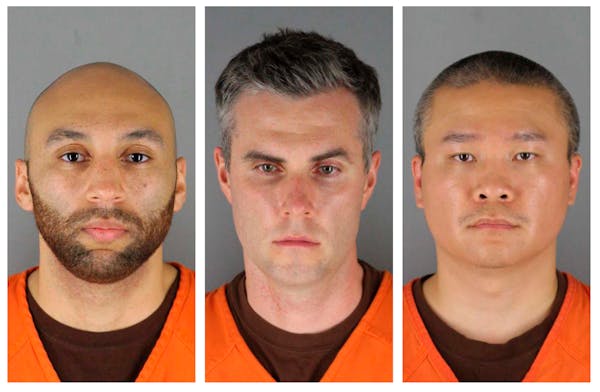Susan Meyers returned to her downtown St. Paul flower shop after a vacation this month to find towering metal fences surrounding the federal courthouse across the street.
"I was just shocked and appalled," said Meyers, whose apartment is attached to her business, A Pocket Full of Posies.
With the civil rights trial for three ex-Minneapolis police officers indicted in connection with George Floyd's murder starting Thursday at the Warren E. Burger Federal Building, Meyers was among neighbors made uneasy by the security preparations, the likes of which many longtime St. Paulites have never seen.
"I don't know what to expect. I'm a little nervous about it," she said. "I certainly hope it doesn't last through Valentine's Day."
Despite complaints from city officials, the high-profile trial of Tou Thao, J. Alexander Kueng and Thomas Lane will be held in Minnesota's capital city because the case was randomly assigned to U.S. District Judge Paul Magnuson, who is based in the St. Paul federal courthouse.
"I am so extremely frustrated," City Council Member Rebecca Noecker, who represents downtown, said at a Jan. 11 meeting. The trial, she said, comes at a cost to taxpayers and disrupts the day-to-day routines of downtown residents.
In a presentation to the council, St. Paul Assistant Police Chief Robert Thomasser said the department will increase police staffing downtown — both on the streets and in the skyways — during the trial and when a verdict is announced, mostly to help people navigate road closures and to fulfill the requests of businesses that asked for extra security.
"I don't think you're going to see anything like … the plan that you saw in Minneapolis for the Derek Chauvin trial," he said. "You're not going to see a heavy police presence."
Cameron Kolbe, a barista at downtown's Legacy Chocolates, said even the courthouse fence that federal agencies installed seems like "overkill."
"I think it's going to put people into an aggressive, tense mode before things even start," Kolbe said.
The skyway bakery where he works is bracing for a potential hit to business because its building manager is closing the street level entrance during the trial as a safety precaution.
Robin Fortier, who owns First Hair Design in the First National Bank Building, said she worries the trial could cause some suburban clients to cancel hair appointments.
"I just hope nothing gets crazy. I think everybody hopes that. I hope we have enough security," Fortier said, adding that she is "cautiously optimistic" that the trial will pass in a peaceful manner.
Thomasser told the council the Police Department has four primary goals: maintain public safety, preserve First Amendment rights, protect critical infrastructure and prevent violent, large-scale civil disobedience.
The department's biggest challenge, he said, will be managing staffing at a time when the already shorthanded force has dozens of officers — 56 as of Tuesday — out sick, many with COVID-19.
St. Paul is coordinating with the East Metro Response Group that was formed ahead of Chauvin's trial last spring — and consists of municipal and county law enforcement groups in Ramsey, Washington and Dakota counties — to help with extra needs if they arise.
The cost of adding patrols and overtime shifts to respond to the trial could cost the city "in the neighborhood of a couple million dollars," said Thomasser, who added that Chief Todd Axtell is seeking some reimbursement from federal agencies.
On Tuesday, the city closed Jackson and Robert streets between Kellogg Boulevard and E. 4th Street for the duration of the trial. The area in front of the courthouse will be blocked off as a pedestrian-only public gathering space, and parking will be limited in the area surrounding the federal building.
Police have been working with the St. Paul Downtown Alliance and Greater St. Paul Building Owners and Managers Association (BOMA) to develop a plan for streamlining communication between public safety officials and businesses. The groups have held dozens of community meetings and distributed fliers with safety guidelines.
As he walked through a skyway near the courthouse around lunchtime Tuesday, Brandon Schnier, who works as a mechanical engineer in the UBS Plaza building a few blocks away, said the fences surrounding the building drew his attention to the trial, which he hadn't realized was approaching so quickly.
"I guess in my mind, maybe it comes down to 'better to be safe than sorry,'" he said. "But at the same time, what I've seen down here, it still seems a little extreme just based on how St. Paul typically is."

Trail section at one of Minnesota's most iconic spots closing for rehab

Will 'shotgun only' zone for deer in southern Minnesota be abolished?

Four Minnesotans catch salmonella in outbreak linked to basil sold at Trader Joe's

